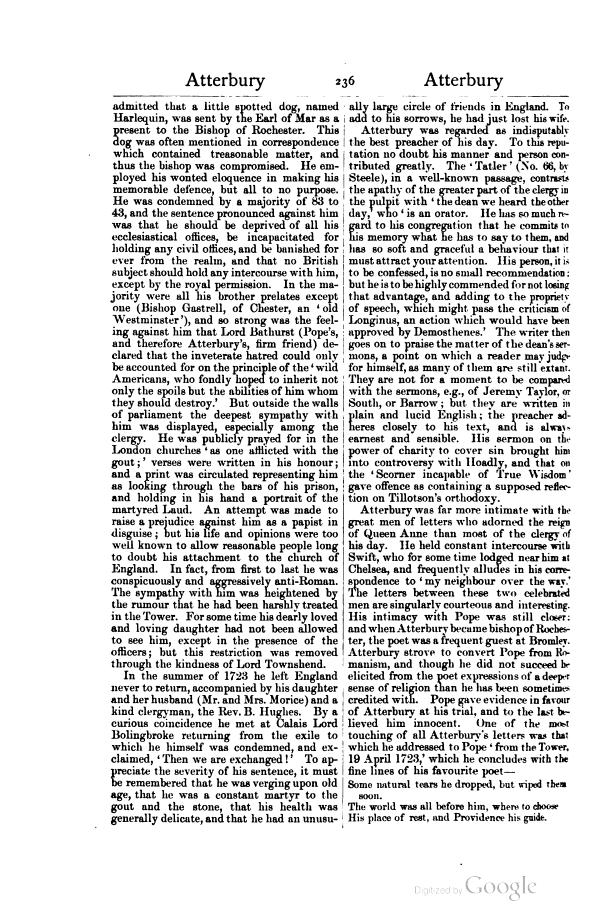admitted that a little spotted dog, named Harlequin, was sent by the Earl of Mar as a present to the Bishop of Rochester. This dog was often mentioned in correspondence which contained treasonable matter, and thus the bishop was compromised. He employed his wonted eloquence in making his memorable defence, but all to no purpose. He was condemned by a majority of 83 to 43, and the sentence pronounced against him was that he should be deprived of all his ecclesiastical offices, be incapacitated for holding any civil offices, and be banished for ever from the realm, and that no British subject should hold any intercourse with him, except by the royal permission. In the majority were all his brother prelates except one (Bishop Gastrell, of Chester, an 'old Westminster'), and so strong was the feeling against him that Lord Bathurst (Pope's, and therefore Atterbury's, firm friend) declared that the inveterate hatred could only be accounted for on the principle of the 'wild Americans, who fondly hoped to inherit not only the spoils but the abilities of him whom they should destroy.' But outside the walls of parliament the deepest sympathy with him was displayed, especially among the clergy. He was publicly prayed for in the London churches 'as one afflicted with the gout;' verses were written in his honour; and a print was circulated representing him as looking through the bars of his prison, and holding in his hand a portrait of the martyred Laud. An attempt was made to raise a prejudice against him as a papist in disguise; but his life and opinions were too well known to allow reasonable people long to doubt his attachment to the church of England. In fact, from first to last he was conspicuously and aggressively anti-Roman. The sympathy with him was heightened by the rumour that he had been harshly treated in the Tower. For some time his dearly loved and loving daughter had not been allowed to see him, except in the presence of the officers; but this restriction was removed through the kindness of Lord Townshend.
In the summer of 1723 he left England never to return, accompanied by his daughter and her husband (Mr. and Mrs. Morice) and a kind clergyman, the Rev. B. Hughes. By a curious coincidence he met at Calais Lord Bolingbroke returning from the exile to which he himself was condemned, and exclaimed, 'Then we are exchanged!' To appreciate the severity of his sentence, it must be remembered that he was verging upon old age, that he was a constant martyr to the gout and the stone, that his health was generally delicate, and that he had an unusually large circle of friends in England. To add to his sorrows, he had just lost his wife. Atterbury was regarded as indisputably the best preacher of his day. To this reputation no doubt his manner and person contributed greatly. The 'Tatler' (No. 66, by Steele), in a well-known passage, contrasts the apathy of the greater part of the clergy in the pulpit with 'the dean we heard the other day,' who 'is an orator. He has so much regard to his congregation that he commits to his memory what he has to say to them, and has so soft and graceful a behaviour that it must attract your attention. His person, it is to be confessed, is no small recommendation; but he is to be highly commended for not losing that advantage, and adding to the propriety of speech, which might pass the criticism of Longinus, an action which would have been approved by Demosthenes.' The writer then goes on to praise the matter of the dean's sermons, a point on which a reader may judge for himself, as many of them are still extant. They are not for a moment to be compared with the sermons, e.g., of Jeremy Taylor, or South, or Barrow; but they are written in plain and lucid English; the preacher adheres closely to his text, and is always earnest and sensible. His sermon on the power of charity to cover sin brought him into controversy with Hoadly, and that on the 'Scorner incapable of True Wisdom' gave offence as containing a supposed reflection on Tillotson's orthodoxy.
Atterbury was far more intimate with the great men of letters who adorned the reign of Queen Anne than most of the clergy of his day. He held constant intercourse with Swift, who for some time lodged near him at Chelsea, and frequently alludes in his correspondence to 'my neighbour over the way.' The letters between these two celebrated men are singularly courteous and interesting. His intimacy with Pope was still closer; and when Atterbury became bishop of Rochester, the poet Awas a frequent guest at Bromley. Atterbury strove to convert Pope from Romanism, and though he did not succeed he elicited from the poet expressions of a deeper sense of religion than he has been sometimes credited with. Pope gave evidence in favour of Atterbury at his trial, and to the last believed him innocent. One of the most touching of all Atterbury's letters was that which he addressed to Pope 'from the Tower, 19 April 1723,' which he concludes with the fine lines of his favourite poet —
Some natural tears he dropped, but wiped them soon.
The world was all before him, where to choose
His place of rest, and Providence his guide.
